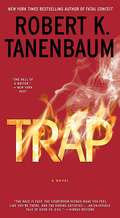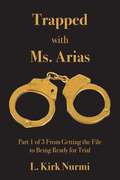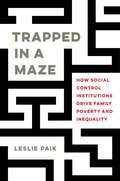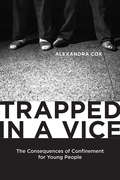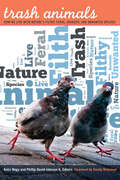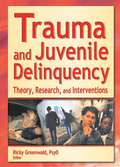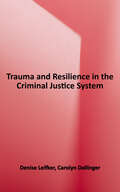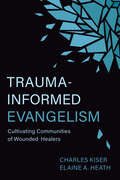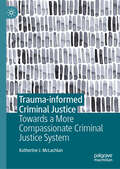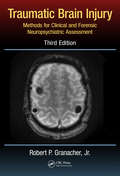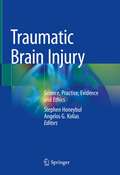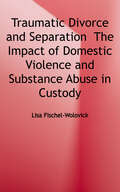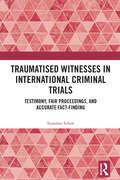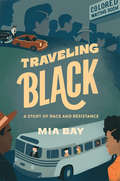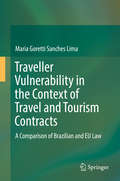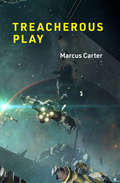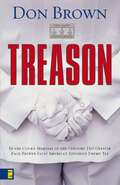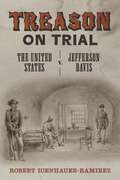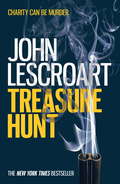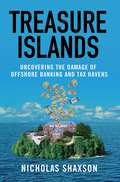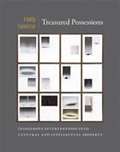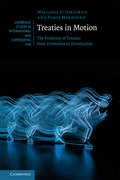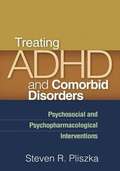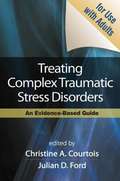- Table View
- List View
Trap (A Butch Karp-Marlene Ciampi Thriller #27)
by Robert K. Tanenbaum“The pace is fast, the courtroom scenes make you feel like you’re there” (Kirkus Reviews)—a devastating deadly explosion sets a breakneck tone that never lets up in New York Times bestselling author Robert K. Tanenbaum’s action-packed Butch Karp legal drama.A tremendous fatal blast rocks a book-signing event where supporters have gathered to see the inspirational leading advocate for New York City charter schools, a Holocaust survivor. A neo-Nazi is the prime suspect, but District Attorney Butch Karp believes the hate crime may be a cover-up for a more sinister plot. The treacherous teacher’s union president has long been furious at the unqualified successes of the charter school movement, which threatens to expose his corrupt practices—manipulation and misappropriation of union funds and, now, possibly even murder. But is there another motive behind the attack that could derail the case? How will Karp discover the set-up, and can he do so in time to bring justice? This exciting legal thriller ends in a dramatic courtroom showdown that proves New York Times bestselling author Robert K. Tanenbaum is always at the top of his game.
Trapped With Ms. Arias: Part 1 of 3 From Getting The File To Being Ready for Trial (Trapped With Ms. Arias)
by L. Kirk NurmiMost people became interested in the State of Arizona v. Jodi Arias January 2, 2013, when opening statements were delivered. Over time that interest became a media sensation and a world-wide phenomenon. However, as her attorney I know that what you saw at trial is only part of the story. Have you ever wondered what happened before the trial began, what it was like to deal with Ms. Arias when the cameras were not rolling? In this book I detail for the reader what happened before the case began, what happened before the cameras were on. I detail the things that you do not know, things that will describe my reality, the reality that I was "Trapped with Ms. Arias."
Trapped in a Maze: How Social Control Institutions Drive Family Poverty and Inequality
by Leslie PaikTrapped in a Maze provides a window into families' lived experiences in poverty by looking at their complex interactions with institutions such as welfare, hospitals, courts, housing, and schools. Families are more intertwined with institutions than ever as they struggle to maintain their eligibility for services and face the possibility that involvement with one institution could trigger other types of institutional oversight. Many poor families find themselves trapped in a multi-institutional maze, stuck in between several systems with no clear path to resolution. Tracing the complex and often unpredictable journeys of families in this maze, this book reveals how the formal rationality by which these institutions ostensibly operate undercuts what they can actually achieve. And worse, it demonstrates how involvement with multiple institutions can perpetuate the conditions of poverty that these families are fighting to escape.
Trapped in a Vice: The Consequences of Confinement for Young People
by Alexandra CoxTrapped in a Vice explores the consequences of a juvenile justice system that is aimed at promoting change in the lives of young people, yet ultimately relies upon tools and strategies that enmesh them in a system that they struggle to move beyond. The system, rather than the crimes themselves, is the vice. Trapped in a Vice explores the lives of the young people and adults in the criminal justice system, revealing the ways that they struggle to manage the expectations of that system; these stories from the ground level of the justice system demonstrate the complex exchange of policy and practice.
Trash Animals: How We Live with Nature’s Filthy, Feral, Invasive, and Unwanted Species
by Kelsi Nagy Phillip David Johnson IIWhy are some species admired or beloved while others are despised? An eagle or hawk circling overhead inspires awe while urban pigeons shuffling underfoot are kicked away in revulsion. Fly fishermen consider carp an unwelcome trash fish, even though the trout they hope to catch are often equally non-native. Wolves and coyotes are feared and hunted in numbers wildly disproportionate to the dangers they pose to humans and livestock. In Trash Animals, a diverse group of environmental writers explores the natural history of wildlife species deemed filthy, unwanted, invasive, or worthless, highlighting the vexed relationship humans have with such creatures. Each essay focuses on a so-called trash species—gulls, coyotes, carp, cockroaches, magpies, prairie dogs, and lubber grasshoppers, among others—examining the biology and behavior of each in contrast to the assumptions widely held about them. Identifying such animals as trash tells us nothing about problematic wildlife but rather reveals more about human expectations of, and frustrations with, the natural world. By establishing the unique place that maligned species occupy in the contemporary landscape and in our imagination, the contributors challenge us to look closely at these animals, to reimagine our ethics of engagement with such wildlife, and to question the violence with which we treat them. Perhaps our attitudes reveal more about humans than they do about the animals. Contributors: Bruce Barcott; Charles Bergman, Pacific Lutheran U; James E. Bishop, Young Harris College; Andrew D. Blechman; Michael P. Branch, U of Nevada, Reno; Lisa Couturier; Carolyn Kraus, U of Michigan–Dearborn; Jeffrey A. Lockwood, U of Wyoming; Kyhl Lyndgaard, Marlboro College; Charles Mitchell, Elmira College; Kathleen D. Moore, Oregon State U; Catherine Puckett; Bernard Quetchenbach, Montana State U, Billings; Christina Robertson, U of Nevada, Reno; Gavan P. L. Watson, U of Guelph, Ontario, Canada.
Trauma and Juvenile Delinquency: Theory, Research, and Interventions
by Ricky GreenwaldLearn how and why trauma is relevant to juvenile delinquency-and what to do about it! This groundbreaking book addresses the connection between childhood trauma and juvenile delinquency. Trauma and Juvenile Delinquency: Theory, Research, and Interventions begins with two chapters presenting theoretical models of the relationship between trauma and the development/persistence of antisocial behavior. Another chapter addresses trauma-related assessment issues for juveniles, and several chapters present cutting-edge research on various aspects of the relationship between trauma and delinquency. Finally, several chapters focus on theory-based and empirically supported trauma-focused therapeutic interventions for juvenile delinquents. No other single source provides such breadth and depth of coverage on this topic! From the editor: "Disruptive behavior disorders are by far the largest type of mental health referral for children and adolescents, while juvenile crime and violence continue to be major social concerns. Several bodies of literature have converged to suggest that trauma is more than incidental to the problem of juvenile delinquency, it contributes to the problem." Trauma and Juvenile Delinquency: Theory, Research, and Interventions explores: how trauma relates to conduct disorder the connection between traumatic victimization and oppositional/defiance problems ways to assess PTSD in adolescents how exposure to violence, delinquent activity, and posttraumatic stress symptomatology are related the unique trauma histories of incarcerated girls and the problems they have adjusting to life within the juvenile justice system how to develop group therapy services for incarcerated male juvenile offenders with PTSD This valuable book also examines the effectiveness of EMDR (Eye Movement Desensitization and Reprocessing) for boys with conduct problems, MASTR (Motivation - Adaptive Skills - Trauma Resolution) for teens with school-related problems, and CPT (Cognitive Processing Therapy) for juvenile delinquents with post-traumatic stress disorder.
Trauma and Resilience in the Criminal Justice System
by Denise Leifker Carolyn DallingerTrauma and Resilience in the Criminal Justice System will help criminal justice practitioners and students develop skills to be the most effective professionals possible by increasing awareness and pointing out places for empathy and change. Readers will examine the enforcement, court, and correctional systems to determine where trauma plays a destructive part. From the point of view of police, detectives, judges, jurors, attorneys, correctional and probation officers, prisoners, and others, the reader will learn the potentially harmful and sometimes devastating impacts of trauma. Readers will also learn from practicing criminal justice officials some potentially impactful actions they can take to build resilience. This book could lead to new perspectives and methods in improving the future of the criminal justice system.
Trauma-Informed Evangelism: Cultivating Communities of Wounded Healers
by Elaine Heath Charles Kiser&“We are at the forefront of a new reformation.&” So declares Elaine Heath in Trauma-Informed Evangelism, aiming to recover the God of love from the structures of hate that pervade Christian communities in America today. In their new guide, she and Charles Kiser work toward bringing this reformation to fruition through ministering specifically to the spiritually traumatized. Over the course of their study, Kiser and Heath amplify the voices of those who suffered misogynistic, racist, or homophobic abuse at the hands of the church. While carefully listening to these stories, Kiser and Heath bring them into conversation with the passion and resurrection of Jesus. Engaging with womanist and liberation theology, they see in the crucifixion a God who does not valorize suffering but shares the experience of the traumatized. Ultimately, this theodicy leads them to propose a new evangelism—one based not on fear and coercion but on witnessing the unconditional love of God. Timely, theologically informed, and eminently practical, Trauma-Informed Evangelism will serve as a formative guide for church leaders and students seeking to aid trauma survivors in their communities. Discussion questions conclude each chapter.
Trauma-informed Criminal Justice: Towards a More Compassionate Criminal Justice System
by Katherine J. McLachlanThis book is the first to examine trauma-informed criminal justice responses to the commission of crime and its impact through empathy and humanity. Trauma-informed criminal justice uses compassion to achieve a safer community for everyone. There are three parts: the first examines how adversity, trauma and crime are related. The second focuses on trauma-informed criminal justice responses to people who have offended, victims of crime, and professionals at risk of vicarious trauma. The third focuses on trauma-informed sentencing and compassionate justice through therapeutic jurisprudence and judicial empathy. Each chapter is designed to be a stand-alone resource.
Traumatic Brain Injury: Methods for Clinical and Forensic Neuropsychiatric Assessment,Third Edition
by Daryl B. Lund Robert P. Granacher Jr.Traumatic Brain Injury: Methods for Clinical and Forensic Neuropsychiatric Assessment, Third Edition provides physicians and psychologists with a scientifically based schema for the clinical evaluation of traumatic brain injury (TBI). The book assists physicians and psychologists in developing treatment plans for patients who have sustained TBIs an
Traumatic Brain Injury: Science, Practice, Evidence and Ethics
by Stephen Honeybul Angelos G. KoliasThis book provides a comprehensive analysis of the contemporary management of all aspects of traumatic brain injury (TBI), combining the findings of several recent randomised controlled trials investigating the role of hypothermia, erythropoietin, intracranial pressure monitoring and decompressive craniectomy in the management of TBI. The book is divided into four sections: the first section covers the epidemiology of TBI, the changing global patterns of presentation, and the basic pathophysiology and classification, while the second discusses contemporary management of TBI, from pre-hospital care, emergency assessment, and medical and surgical management to rehabilitation and social reintegration. The third section then examines the evidence gained from recent clinical trials that have investigated the efficacy of management strategies involving intracranial pressure monitoring, multimodal monitoring, hypothermia, erythropoietin, thromboembolic prophylaxis and decompressive craniectomy. Lastly, the fourth section explores the ethical issues, both at the societal level and on an individual basis. Written by a broad range of experts, this book provides a valuable reference resource for neurosurgeons, intensivists, clinicians with ethical experience and pure bioethicists in their daily work.
Traumatic Divorce and Separation: The Impact Of Domestic Violence And Substance Abuse In Custody And Divorce
by Lisa Fischel-WolovickTraumatic Divorce and Separation integrates the conflicting mental health perspectives concerning trauma theory and the study of divorce, in what the author has termed "traumatic divorce" -- that is, divorce complicated by the high-risk factors of domestic violence, mental illness, and/or substance abuse. The text's interdisciplinary discussion examines issues of financial disparities for women following divorce, traumatic symptoms in children and adults, and the legal controversies about the admissibility of psychological theories related to abuse. The author also addresses: domestic violence as a gendered crime against women; the need for a trauma-informed judicial response; and the need for a systemic judicial response that incorporates an understanding of domestic violence and child maltreatment to provide services and protections. The book is an invaluable resource for professionals and academics in social work, forensic psychology, law, and related mental health fields, as well as academics interested in gender based discrimination in the courts.
Traumatised Witnesses in International Criminal Trials: Testimony, Fair Proceedings, and Accurate Fact-Finding
by Suzanne SchotThis book focuses on the testimonial evidence of traumatised witnesses in trials of international crimes, which deal with acts of genocide, war crimes and crimes against humanity. Such trials often involve the testimonies of those who experienced or witnessed extremely traumatic events, which can make it hard for these witnesses to recall specific details. Testifying during trial may in itself also pose challenges to their well-being. Yet the legal process of determining whether someone can be held criminally responsible for the alleged crimes needs to be fair, in accordance with the right to a fair trial of the accused, and the facts need to be determined as accurately as possible. This book argues that to ensure fair and accurate fact-finding when in particular traumatised witnesses testify, a balance needs to be struck between the needs of witnesses who testify about traumatic experiences, the fair trial rights of the accused and the objective of the court to establish as accurately as possible the responsibility of the accused. This is crucial throughout the stages of selecting, preparing, presenting and assessing the testimonial evidence of traumatised witnesses. The methodology involves an analysis of transcripts of proceedings and case law of the International Criminal Tribunal for the former Yugoslavia, the International Criminal Court and Dutch courts prosecuting international crimes. The research demonstrates that it is often difficult to strike a balance between the competing objectives during proceedings when traumatised witnesses testify due to the current lack of regulations and guidelines applicable during investigations and prosecutions. This book shows that this balance can, and should, be achieved when traumatised witnesses testify during criminal proceedings for international crimes. The work is an invaluable resource for researchers, academics and practitioners in criminal law, criminology, legal psychology, legal psychiatry, social anthropology and forensic sciences.
Traveling Black: A Story of Race and Resistance
by Mia BayA riveting, character-rich account of racial segregation in America that reveals just how central travel restrictions were to the creation of Jim Crow laws—and why “traveling Black” has been at the heart of the quest for racial justice ever since. Why have white supremacists and civil rights activists been so focused on Black mobility? From Plessy v. Ferguson to #DrivingWhileBlack, African Americans have fought for over a century to move freely around the United States. Curious as to why so many cases contesting the doctrine of “separate but equal” involved trains and buses, Mia Bay went back to the sources with some basic questions: How did travel segregation begin? Why were so many of those who challenged it in court women? How did it move from one form of transport to another, and what was it like to be caught up in this web of contradictory rules? From stagecoaches, steamships, and trains to buses, cars, and planes, Traveling Black explores when, how, and why racial restrictions took shape and brilliantly portrays what it was like to live with them. “There is not in the world a more disgraceful denial of human brotherhood than the ‘Jim Crow’ car of the southern United States,” W. E. B. Du Bois famously declared. Bay unearths troves of supporting evidence, rescuing forgotten stories of undaunted passengers who made it back home despite being insulted, stranded, re-routed, and ignored. Black travelers never stopped challenging these humiliations and insisting on justice in the courts. Traveling Black upends our understanding of Black resistance, documenting a sustained fight that falls outside the traditional boundaries of the Civil Rights Movement. A masterpiece of scholarly and human insight, this book helps explain why the long, unfinished journey to racial equality so often takes place on the road.
Traveller Vulnerability in the Context of Travel and Tourism Contracts: A Comparison Of Brazilian And Eu Law
by Maria Goretti Sanches LimaThe book highlights the link between consumers and travellers, identifying the meaning of vulnerability in Brazil and the EU. It also covers different types of contracts for tourism and travel services, including online booking processes. Only after 2015, as a result of the directive on package travel and linked travel arrangements, did the EU begin viewing travellers as consumers in the sense of Union Consumer Law; conversely, in Brazil, the traveller has no legal status whatsoever and is considered solely a consumer. As the traveller is implicitly a consumer he/she is subject to vulnerability. However, the definition of vulnerability differs considerably between Brazil and the EU: while in Brazil it is a principle stemming from the Consumer Defence Code, covering all consumers, in the EU vulnerability is not an established principle. In the EU, although the average consumer is assumed to be reasonably well informed, observant and circumspect, they are also recognised as the weaker party in the contract. That recognition does not fit with the notion of "confident consumer". Vulnerable consumers in the EU are those whose individual characteristics, such as their age, physical or mental infirmity, or credulity, make them particularly susceptible to unfair commercial practices. Conversely, in Brazil these consumers are seen as being hyper-vulnerable, rather than solely vulnerable. In this context, travellers are in a weaker position than regular consumers buying goods or services, because they are outside of their domicile or jurisdiction for a brief or extended period of time. This book examines two types of traveller vulnerability that make travellers, particularly international ones, a special type of consumers: 1. External and 2. Legal (jurisdiction). Travellers’ vulnerability mainly stems from consumers travelling to different markets and different cultures. As such, they are subject to different laws that require special global attention. While both the EU and Brazilian system have their respective advantages and disadvantages, the goal of both must be to further increase protection for travellers, including business travellers. In consumer societies, the traveller is indeed a consumer by logical causation and hence a “special consumer”.
Treacherous Play (Playful Thinking)
by Marcus CarterThe ethics and experience of &“treacherous play&”: an exploration of three games that allow deception and betrayal—EVE Online, DayZ, and Survivor.Deception and betrayal in gameplay are generally considered off-limits, designed out of most multiplayer games. There are a few games, however, in which deception and betrayal are allowed, and even encouraged. In Treacherous Play, Marcus Carter explores the ethics and experience of playing such games, offering detailed explorations of three games in which this kind of &“dark play&” is both lawful and advantageous: EVE Online, DayZ, and the television series Survivor. Examining aspects of games that are often hidden, ignored, or designed away, Carter shows the appeal of playing treacherously. Carter looks at EVE Online&’s notorious scammers and spies, drawing on his own extensive studies of them, and describes how treacherous play makes EVE successful. Making a distinction between treacherous play and griefing or trolling, he examines the experiences of DayZ players to show how negative experiences can be positive in games, and a core part of their appeal. And he explains how in Survivor&’s tribal council votes, a player&’s acts of betrayal can exact a cost. Then, considering these games in terms of their design, he discusses how to design for treacherous play. Carter&’s account challenges the common assumptions that treacherous play is unethical, antisocial, and engaged in by bad people. He doesn&’t claim that more games should feature treachery, but that examining this kind of play sheds new light on what play can be.
Treason (The Navy Justice Series #1)
by Don BrownThe stakes are high . . . and the entire world is waiting for the verdict. The Navy has uncovered a group of radical Islamic clerics who have infiltrated the Navy Chaplain Corps, inciting sailors and marines to acts of terrorism. And Lieutenant Zack Brewer has been chosen to prosecute them for treason and murder. Only three years out of law school, Zack has already made a name for himself, winning the coveted Navy Commendation medal. Just coming off a high-profile win, this case will challenge the very core of Zack's skills and his Christian beliefs-beliefs that could cost him the case and his career. With Diane Colcernian, his staunchest rival, as assistant prosecutor, Zack takes on internationally acclaimed criminal defense lawyer Wells Levinson. And when Zack and Diane finally agree to put aside their animosity, it causes more problems than they realize.
Treason in Roman and Germanic Law: Collected Papers
by Floyd Seyward Lear"Treason" is a word with many connotations, a word applied to a host of varied offenses throughout the history of mankind. These essays by Floyd Seyward Lear analyze the development of the political theory of treason from its beginning in Roman Law to its transformation in the Germanic custom of the early Middle Ages. The author has presented treason as a political idea, possessing historical continuity, though varying from age to age as it follows the evolution of political authority itself. These studies trace the shifting emphasis in crimes against the state from acts directed against a central absolutist authority to acts involving the personal relationship of a pledged troth and individual fealty. This is a shift from the concept of majesty in Roman law to the concept of fidelity in Germanic law with the corollary shift from allegiance as an act of deference to allegiance as a token of mutual fidelity. These ideas are examined chronologically across an interval extending from archaic Roman law to incipiently feudal forms, from which modern theories of treason, allegiance, and sovereignty derive. Contemporary concepts in these political areas can hardly be understood apart from their historical origins. Broadly considered, this work is intended as a contribution to intellectual history. Further, this collection represents the synthesis of material widely scattered in the primary sources and relevant secondary works. The two concluding bibliographical essays are intended as a general survey of the literature relevant to these studies in Roman and Germanic public law. Descriptive and interpretive works which deal with treason and its allied aspects of political and legal theory are not numerous in the English language.
Treason on Trial: The United States v. Jefferson Davis (Conflicting Worlds: New Dimensions of the American Civil War)
by Robert Icenhauer-RamirezIn the immediate aftermath of the Civil War, federal officials captured, imprisoned, and indicted Jefferson Davis for treason. If found guilty, the former Confederate president faced execution for his role in levying war against the United States. Although the federal government pursued the charges for over four years, the case never went to trial. In this comprehensive analysis of the saga, Treason on Trial, Robert Icenhauer-Ramirez suggests that while national politics played a role in the trial’s direction, the actions of lesser-known individuals ultimately resulted in the failure to convict Davis. Early on, two primary factions argued against trying the case. Influential northerners dreaded the prospect of a public trial, fearing it would reopen the wounds of the war and make a martyr of Davis. Conversely, white southerners pointed to the treatment and prosecution of Davis as vindictive on the part of the federal government. Moreover, they maintained, the right to secede from the Union remained within the bounds of the law, effectively linking the treason charge against Davis with the constitutionality of secession. While Icenhauer-Ramirez agrees that politics played a role in the case, he suggests that focusing exclusively on that aspect obscures the importance of the participants. In the United States of America v. Jefferson Davis, preeminent lawyers represented both parties. According to Icenhauer-Ramirez, Lucius H. Chandler, the local prosecuting attorney, lacked the skill and temperament necessary to put the case on a footing that would lead to trial. In addition, Supreme Court Chief Justice Salmon P. Chase had little desire to preside over the divisive case and intentionally stymied the prosecution’s efforts. The deft analysis in Treason on Trial illustrates how complications caused by Chandler and Chase led to a three-year delay and, eventually, to the dismissal of the case in 1868, when President Andrew Johnson granted blanket amnesty to those who participated in the armed rebellion.
Treasure Hunt (Wyatt Hunt, book 2): A riveting crime thriller with unexpected twists
by John LescroartCharity can be murder...Wyatt Hunt - hero of John Lescroart's New York Times bestseller The Hunt Club - returns in an intricate, tightly plotted thriller set against San Francisco's glamorous charity circuit. Perfect for fans of Michael Connelly and Lee Child. 'Breath-taking' - LA Times When Mickey Dade discovers the body of Dominic Como, he sees this as his chance to prove himself. He's been stuck behind a desk at Wyatt Hunt's private investigative service, The Hunt Club, but now seizes the opportunity to work on a real case. Como was one of San Francisco's most high-profile fundraisers and one suspect in the case is Como's business associate, Alicia Thorpe - young, gorgeous, and the sister of one of Mickey's friends. As Mickey and Hunt are pulled into the case, they soon learn that Como was involved in some highly suspect deals. And the lovely Alicia knows more about this - and more about Como - than she's letting on. As the case reaches its nail-biting conclusion, Mickey Dade finds his world crumbling around him as he learns the hard lessons Hunt knows only too well.What readers are saying about Treasure Hunt:'One of his [John Lescroart's] most complex, riveting and entertaining works to date''I was kept guessing until the very end''He [John Lescroart] keeps you interested from page one right to the end of the book'
Treasure Islands: Uncovering the Damage of Offshore Banking and Tax Havens
by Nicholas ShaxsonA troubling look inside the world of tax havens and corporate masterminds. While the United States experiences recession and economic stagnation and European countries face bankruptcy, experts struggle to make sense of the crisis. Nicholas Shaxson, a former correspondent for the Financial Times and The Economist, argues that tax havens are a central cause of all these disasters. In this hard hitting investigation he uncovers how offshore tax evasion, which has cost the U. S. 100 billion dollars in lost revenue each year, is just one item on a long rap sheet outlining the damage that offshoring wreaks on our societies. In a riveting journey from Moscow to London to Switzerland to Delaware, Shaxson dives deep into a vast and secret playground where bankers and multinational corporations operate side by side with nefarious tax evaders, organized criminals and the world's wealthiest citizens. Tax havens are where all these players get to maximize their own rewards and leave the middle class to pick up the bill. With eye opening revelations, Treasure Islands exposes the culprits and its victims, and shows how: *Over half of world trade is routed through tax havens *The rampant practices that precipitated the latest financial crisis can be traced back to Wall Street's offshoring practices *For every dollar of aid we send to developing countries, ten dollars leave again by the backdoor The offshore system sits much closer to home than the pristine tropical islands of the popular imagination. In fact, it all starts on a tiny island called Manhattan. In this fast paced narrative,Treasure Islands at last explains how the system works, how it's contributing to our ever deepening economic divide, and what we might do to reform the system and effect positive change.
Treasured Possessions: Indigenous Interventions into Cultural and Intellectual Property
by Haidy GeismarWhat happens when ritual practitioners from a small Pacific nation make an intellectual property claim to bungee jumping? When a German company successfully sues to defend its trademark of a Māori name? Or when UNESCO deems ephemeral sand drawings to be "intangible cultural heritage"? In Treasured Possessions, Haidy Geismar examines how global forms of cultural and intellectual property are being redefined by everyday people and policymakers in two markedly different Pacific nations. The New Hebrides, a small archipelago in Melanesia managed jointly by Britain and France until 1980, is now the independent nation-state of Vanuatu, with a population that is more than 95 percent indigenous. New Zealand, by contrast, is a settler state and former British colony that engages with its entangled Polynesian and British heritage through an ethos of "biculturalism" that is meant to involve an indigenous population of just 15 percent. Alternative notions of property, resources, and heritage--informed by distinct national histories--are emerging in both countries. These property claims are advanced in national and international settings, but they emanate from specific communities and cultural landscapes, and they are grounded in an awareness of ancestral power and inheritance. They reveal intellectual and cultural property to be not only legal constructs but also powerful ways of asserting indigenous identities and sovereignties.
Treaties in Motion: The Evolution of Treaties from Formation to Termination (Cambridge Studies in International and Comparative Law #149)
by Malgosia Fitzmaurice Panos MerkourisThe law of treaties is in constant motion, understood not only as locomotion, but also as motion through time and as change. Thus, kinesis and stasis, two sides of the same concept of 'motion', are the central themes of Treaties in Motion. The concept of motion adopted in this book is based on the philosophy of Aristotle. He identified six types of motion: creation (genesis), increase (auxesis), diminution (meiosis), alteration (alloiosis), destruction (phthora), and change of place (kata topon metabole), which has been amended by the authors to change in space-time (kata topon kai chronon metavole) to reflect our modern scientific understanding of time as a dimension through which motion and change occurs. Each chapter's analysis proceeds by focusing on a specific area of a treaty's 'life-cycle', where each type of motion shines through and is described through three different frames of reference: treaties, the Vienna Convention of the Law of Treaties, and customary law.
Treating ADHD and Comorbid Disorders
by Steven Pliszka Larry GreenhillChildren and adolescents with attention-deficit/hyperactivity disorder (ADHD) frequently experience co-occurring problems with aggression, mood swings, tics, anxiety, or depression. Organized around detailed case presentations, this highly informative book helps the clinician make sound decisions when assessing and treating the full range of ADHD comorbidities. Experienced child psychiatrist Steven Pliszka offers straightforward guidance on how to avoid common diagnostic errors, develop an individualized medication regimen, minimize health risks and side effects, collaborate successfully with parents, and tailor psychosocial treatments to each family's needs. A reproducible structured interview facilitates sorting out symptoms and distinguishing between different comorbid disorders.
Treating Complex Traumatic Stress Disorders
by Christine Courtois Julian D. FordChronic childhood trauma, such as prolonged abuse or family violence, can severely disrupt a person's development, basic sense of self, and later relationships. Adults with this type of history often come to therapy with complex symptoms that go beyond existing criteria for posttraumatic stress disorder (PTSD). This important book brings together prominent authorities to present the latest thinking on complex traumatic stress disorders and provide practical guidelines for conceptualization and treatment. Evidence-based assessment procedures are detailed, and innovative individual, couple, family, and group therapies are described and illustrated with case vignettes and session transcripts.
